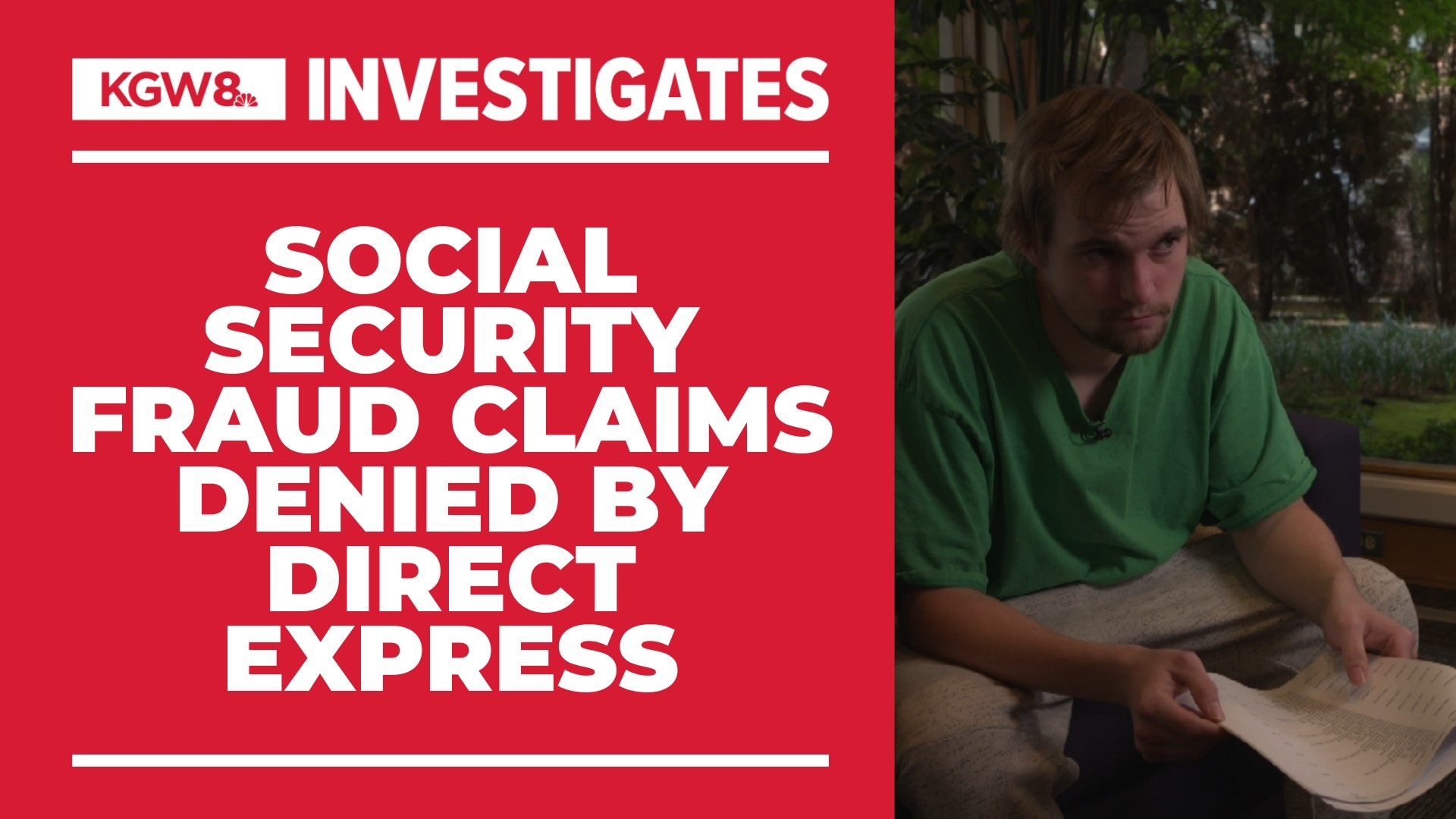PORTLAND, Ore. — $6.57, $6.57, $6.57...
As Andrew Keheley read through 25 pages of transactions on his Direct Express card account, it became clear something was wrong. There were 138 unauthorized charges — all for $6.57, all on the same day.
“It looked like a scam, right away,” Keheley said.
The 28-year-old Portland man relies on Social Security disability benefits. Each month, $954 is automatically deposited into his Direct Express card account.
“I use it for my rent, car insurance and I pay my dog’s pet insurance bill,” Keheley explained.
On Sept. 3, Keheley was getting ready to pay his rent when he discovered his monthly Social Security benefits were almost entirely gone. Earlier in the day, someone had drained his Direct Express card account.
According to his account statement, someone had used Keheley’s benefits to make 138 purchases. Each transaction was for $6.57, along with a 20-cent international purchase fee. The unauthorized purchases appeared to be connected to Facebook in Ireland.
“To this day, I don’t know what they bought,” said Keheley.
Keheley said he has a Facebook account, but he’s never used it to make purchases and there’s no credit card or debit card linked to the social media account. He doesn’t know how fraudsters got his information or access to his Direct Express account.
“I’ve never given anybody my card for any reason, never given anybody my PIN,” Keheley explained.


Keheley immediately called Direct Express to report the fraud. The company said it investigated, but ultimately denied his claim.
“Their conclusion was that I had approved every single one of these charges,” explained Keheley. With no Social Security benefits for the rest of the month, Keheley had no money to pay the bills. He relied on friends and family to help loan him money.
Keheley’s experience mirrors that of many other fraud victims. They complain Direct Express denied refunds to cardholders, despite obvious signs of fraud. They all received the same form letter from Direct Express, declaring that the suspicious charges were authorized and legitimate.
“That’s the same thing that happened to me!” said Terrence Breneman. The Portland man contacted KGW after our initial report about Direct Express denying fraud claims.
In July, the 60-year-old disabled veteran noticed some odd charges on his Direct Express card account.
“$9.99, $9.99, $9.99. Sound like a broken record?” Breneman said as he thumbed through his account statement, which showed 47 charges for $9.99. The unauthorized charges appeared to be connected to Google Play, which sells apps, movies and games.
“I don’t play video games at all,” explained Breneman, who filed a fraud claim with Direct Express.


The Direct Express fraud services department responded with a letter: “After a thorough investigation of the information you have provided, as well as our internal records, we have determined that the transaction(s) in question were not unauthorized; therefore, no error occurred.”
Breneman was dumbfounded. “I don’t think they did an investigation,” he said. “I don’t think they care.”
More than four-and-a-half million people get their federal benefits — including Social Security and Veteran's disability — automatically deposited into a Direct Express card account each month. The debit cards are typically issued to people who don’t have a bank account.
Over the past three years, the Consumer Financial Protection Bureau has received 370 complaints about Direct Express debit card accounts, according to the agency’s online database. The Better Business Bureau’s website is also filled with negative one-star reviews about the company.
“They do not deserve to handle government funds,” said a review posted by Kendreicka. Another review complained customer service was rude and unhelpful. Other people described difficulties in reporting fraud and that fraud claims were denied.
The BBB said it is unable to process complaints against Direct Express because it is a government program of the U.S. Treasury Bureau of Fiscal Service. The BBB encouraged consumers with payment issues to contact U.S. Treasury Electronic Payment Solution Center at DirectExpress@fiscal.treasury.gov.


The government contracts with Comerica Bank to administer the Direct Express program. Comerica declined to answer KGW’s questions.
“We take pride in our work supporting the Direct Express program and providing the service to the millions of Americans who rely on it to receive their federal benefits,” wrote Nicole Idzi Hogan, Comerica national director of corporate communications in a Sept. 13 email to KGW.
In regulatory filings, Comerica has disclosed the Consumer Financial Protection Bureau is investigating some of its business practices.
The Treasury's Office of Inspector General issued reports in 2014, 2017 and 2020 critical of the company's management of the Direct Express program and the bidding process for the government contract. Another report, focused on Direct Express' customer service and compliance with regulations impacting cardholders is expected to be issued in mid-January 2024.
After KGW contacted Comerica inquiring about fraud claims filed by Keheley and Breneman, both men said they got their money back. Hundreds of dollars in benefits were refunded with no explanation or apology.
J.B. Simms is one of eight named plaintiffs in a class action lawsuit against Comerica and affiliated companies, which alleges that fraud victims routinely had their claims denied. He’s also worked to help other veterans get their money back.
“People are overwhelmed. They don’t know what to do,” said Simms, who had his identity stolen when he had a Direct Express debit card.
Simms, a private investigator and author, wrote a book about the subject titled, “Comerica, Conduent and the U.S. Treasury Betrayed Veterans and Other Victims.”
“The Direct Express program has outlived its usefulness,” Simms explained. “People that get their Social Security can opt for any payment vehicle they want.”
Simms encourages veterans to get off Direct Express. They can open a free checking account through the Veterans Benefits Banking Program. People on Social Security can also use an alternative bank or credit union.
That’s what both Keheley and Breneman have done. Both men said, they now receive monthly benefits through direct deposit at a local bank — in hopes of avoiding another bad experience with Direct Express.
“I think there should be a real close look at who handles the government’s money through Social Security,” warned Keheley.

